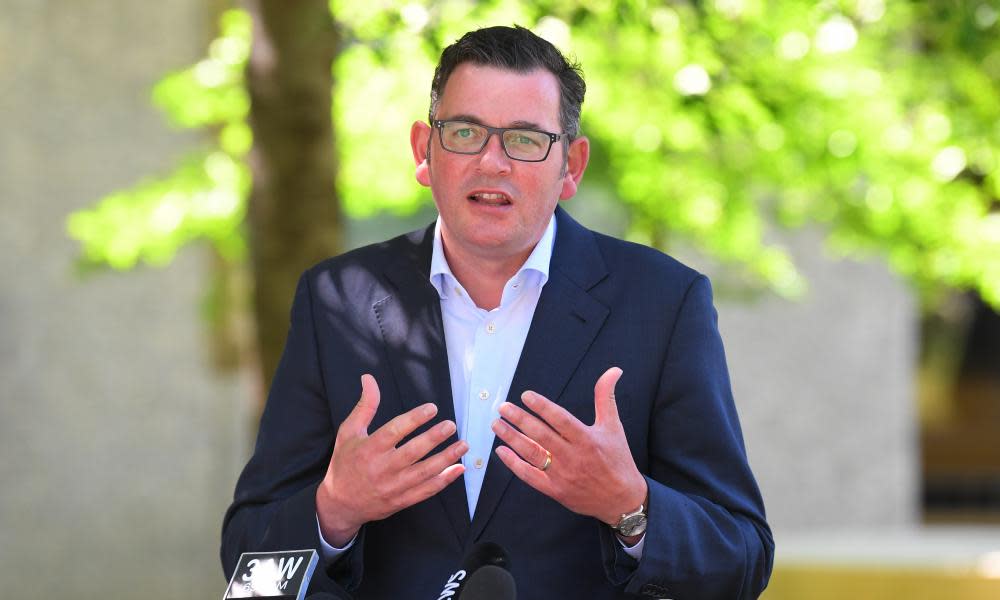Victoria's new hotel quarantine program may employ 'fly-in-fly-out' staff who live on site

Hotel quarantine staff in Victoria will be subject to contact tracing before beginning work and in some cases will live on site, the state’s premier Daniel Andrews has said.
As Victoria celebrated its 26th consecutive day with no new Covid-19 infections on Wednesday, Andrews announced a suite of new measures aimed at preventing a third outbreak of the virus when it resumes overseas hotel quarantine next month.
Andrews also said the state would employ an “exclusive workforce” to operate the hotel quarantine program, promising that workers “won’t have any second jobs”.
“We may well have groups, not necessarily every staff member, but some staff members who actually live in the hotel,” Andrews told the ABC.
Related: Victoria budget: treasurer announces $23.3bn deficit and record spending amid coronavirus recession
“A bit of a fly-in-fly-out arrangement. We’ll advance contact trace all of those people and know who they live with and what the people that they live with do for a living.
“So someone working wouldn’t share a house with someone in an aged care facility, for example. All of that work is going on to make sure that when the program is reset, it is safe and I’m confident that that is what people will be able to do.”
The commitments come as the state prepares to resume its mandatory two-week hotel quarantine for overseas arrivals on 7 December. The program, which is expected to accomodate about 160 returning travellers a day when it resumes, was suspended during the state’s devastating second-wave outbreak which stemmed in part from failures in the “hastily assembled” system.
The Victorian government is still waiting to receive the final report from an inquiry into the scheme which found widespread problems with its operation. An interim report released earlier this month recommended police should be on site 24 hours a day at quarantine sites, and that infection control experts should be “embedded” in each facility.
On Wednesday, the inquiry announced it will hold a final hearing on Friday 27 November in order to tender final evidence and submissions.
Andrews has declined to comment in detail on the interim report, but in a separate interview on Tuesday said it was his “responsibility” to “make sure that we don’t make those mistakes ever again”.
The Victorian government has also sought to combat what Andrews has called the “toxic” nature of insecure work by announcing a pilot program in this week’s state budget to provide some casual and insecure workers in priority industries sick leave and carers leave.
“Insecure work isn’t just bad for those who work under those conditions, it’s bad for all of us and we pay a price for the fact that so many people – particularly those who work in public-facing jobs – do not have sick leave,” he said this week.
With most states continuing to record no new community transmission of the virus, the safety of the various hotel quarantine schemes across the country has come into more urgent focus. The South Australian premier, Steven Marshall, has announced changes to its program, including transferring Covid-19 positive cases in quarantine to a dedicated medical centre, after an outbreak in the state linked to the scheme.
In New South Wales, authorities have also faced questions about the operation of its hotel quarantine program after a report in the Australian revealed some 169 security guards working on the scheme had been sacked.
Related: Australia’s state by state Covid restrictions and coronavirus lockdown rules explained
The scheme is operated by the NSW police with the assistance from hundreds of private security guards from a number of different firms. Guardian Australia has previously revealed that despite its broad success, police had been investigating whether some private security companies contracted to work in the state’s hotel quarantine regime were illegally subcontracting to third parties.
In a statement, a NSW police spokesperson said cases where people had absconded from quarantine were extremely rare.
“During the past seven months a small number of guests – six out of almost 100,000 – were caught in breach of the public health order related to quarantine,” the spokesperson said.
Also on Wednesday the NSW government announced a further relaxation of gathering restrictions in the state. The premier, Gladys Berejiklian, said that from next Tuesday up to 50 people will able to visit a private residence, provided the gathering is using an outdoor space like a backyard or garden.
Smaller homes without an outdoor space will be able to have 30 visitors from 1 December.


